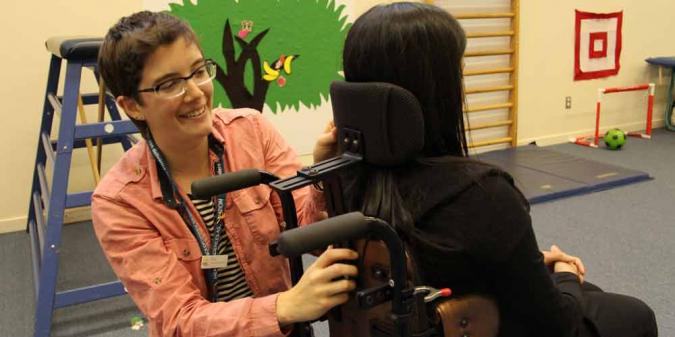Edith MacHattie, Occupational Therapist
HSA REPORT, DECEMBER 2013
BY LAURA BUSHEIKIN
By any standards, Edith MacHattie's job is immensely challenging.
The school-aged children she works with as an Occupational Therapist at Surrey's Centre for Child Development are the most medically complex kids.
"We focus on the most compromised. These are not just kids having trouble with handwriting," she says. "Most are in wheelchairs, some are not verbal, some need feeding support, some need an alternative to oral food.
"In terms of diagnosis, it's mainly kids with neurodevelopmental diagnoses, like cerebral palsy, but also extremely rare genetic conditions, and kids with progressive diseases, and some with no diagnosis at all because no one knows what's going on.
The vibrantly multicultural nature of her clientele adds an extra layer of complexity. "Surrey has a fantastic community of new families to Canada, families who have been here for only a couple of years, families who have lived through extraordinary circumstances in their country of origin. So there are a lot of really resilient families, and a lot who have lived through very challenging circumstances."
While the families she works with are deeply committed to supporting their child, they are also often struggling with residue of past trauma and the daily challenges of immigrant life – speaking the language, getting a job, paying the bills, figuring out how everything works.
Despite the challenges, when MacHattie talks about her work, she lights up. "There are so many things I love about it. Every single day at work I realize how lucky I am.
"Watching a child complete a skill for the first time or discovering independent mobility in a power chair is incredible. You watch their life change in front of you. You see the pride and sense of accomplishment on their faces.
"And in their family, you see the light bulb moment – my kid can do that! – it's awesome. And when you see classrooms getting really excited about a way a student can participate. Seeing other students giving them high fives as they move down the hall.
"It's such hopeful work when that happens," concludes MacHattie.
Occupational Therapy, she says, is a difficult profession to define. "OTs help people overcome whatever barriers are in their way so they can participate in their lives to their full potential."
MacHattie will recommend and work with adaptive equipment such as wheelchairs, bathroom fixtures, adaptive chairs and desks, writing and eating utensils, mattresses, beds, lifts and ramps; she consults on home and school renovations; recommends strategies for comfortable sleep to prevent pressure sores, and suggests ways children can participate in feeding themselves.
"If a family is keen on a child learning to zip up a jacket, I can help break down the components to help them teach this skill to their kid."
MacHattie works closely with school staff and families. "It doesn't really help if I am the only person this kid can do this magical new thing with. The family is key. We work together to develop goals that are meaningful to them."
Building long-term relationships with the families takes patience and understanding.
"Our program is meant to be low barrier so we go out into the community to provide service. A lot of families are working multiple jobs and don't have transportation. Also, seeing people in their own space helps minimize the power imbalance between the 'professional' and the family, which is really important. Some of these families have had really bad experiences with authorities in the past, so building trust can take a long time. It sometimes takes years."
And it is a process of continual learning for MacHattie. "In our OT department, we have talked about cultural safety and how to look at our own biases and understand how our background will impact our clients' experience of health care," she says. "We are part of an interdisciplinary team including physiotherapists, speech therapists, and social service workers. Also we work with community partners which help support our multicultural families, for instance providing basics such as language interpreters."
This too is part of why MacHattie loves her work. "It's such a privilege to be able to watch as communities rise up around these children to support them," she says.
MacHattie does admit to frustrations at work. "The hugest challenge is the lack of funding. There are about five full-time-equivalent OTs for the Surrey School District and thousands of kids who need support. It's a difficult ethical situation. The kids I work with are the most vulnerable, but the kids who need just a bit of help don't get seen by anyone. I walk into the school and have to say sorry, I can only see two kids. But there are 25 others who would need my support."
MacHattie channels her frustration into activism. She has been Chief Steward at her facility for two years, is a member of the HSPBA bargaining team, and is an HSA Constituency Liaison, meeting with her MLA regularly to explain and advocate for health care needs.
She knows she is helping every day via her work, but says that means little if nothing is getting better on a systemic level. "These families are impacted so much by policies, funding choices, and unfair immigration laws. I can't sit back and do nothing."
Clearly, in her political activism, as in her profession, MacHattie sees challenges as opportunities to do meaningful work.
